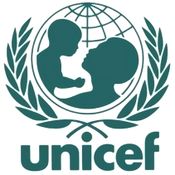UNICEF
 | |
| Deputy Director: | |
|---|---|
| Stephen H. Lewis (1995-1999) | |
| Rao Gupta (2011) | |
| Related Organizations: | |
| UNAIDS | |
| World Health Organization |
UNICEF promotes the circumcision of children in violation of international human rights law as HIV prevention policy.[1]
Contents
Children & AIDS brochure
| “ | Young people everywhere need accurate and relevant information about sexual and reproductive health and HIV transmission, as well as opportunities to build risk-reduction skills. They also need access to appropriate HIV prevention services, including voluntary counseling and testing, harm reduction, sexual and reproductive health services, PMTCT and male circumcision, and to commodities including condoms. (UNICEF)[2] |
Swaziland
UNAIDS is working with the Swaziland Ministry of Health to introduce and scale up neonatal circumcision.[3]
Point of Interest: In recent studies, HIV transmission was found to be more prevalent in circumcised males in Swaziland. The drive to circumcise the majority of Swazi men continues none the less.[4]
Rape scandals
Various children rape scandals of leading UNICEF members like Peter Newell are documented and cast another shadow on the children's rights organization.[5][6]
Criticism
The VMMC Experience Project has published a massive, illustrated 153-page report on VMMC in Africa for the United Nations.[7]
Double standard
UNICEF has published an article on the subject of female circumcision with the title "No child should experience such pain" on their German blog 2021.[8] No boys are mentioned here. To comments in the blog that indicate that UNICEF is arguing very one-sidedly here, UNICEF replies with a standard text module in which it says:
| “ | Female genital mutilation / circumcision is a serious violation of human and children's rights. It can lead to lifelong complaints and complications. For many girls, the procedure is fatal. The abolition of this practice is the goal of the international community in the Agenda for Sustainable Development (SDG Goal No. 5). We are committed to this goal, including with this contribution. We know that the issue of male circumcision is controversial and emotional. UNICEF takes seriously the concerns raised about the right to physical integrity and self-determination. – Laura Sandgathe (UNICEF)[8] |
German intactivist Ulf Dunkel responded to this on his blog and wrote a comprehensive reply that proves UNICEF double standards.[9]
See also
External links
 (2020).
(2020). HIV/AIDS
, Doctors Opposing Circumcision. Retrieved 16 July 2020.
References
- ↑

Eastern and Southern Africa: Medical male circumcision
, UNICEF. Retrieved 29 April 2011.
Quote:[...] the Government and UNICEF are working together to introduce infant male circumcision [...]
- ↑ Key Messages of Chapter 3. Children and AIDS. pg.15 (2008)
- ↑
 Mazzotta, Meredith (4 March 2011)."Swaziland embarks on ambitious plan to circumcise 80 percent of men 18 to 49 this year", Science Speaks: HIV & TB News. Retrieved 6 May 2011.
Mazzotta, Meredith (4 March 2011)."Swaziland embarks on ambitious plan to circumcise 80 percent of men 18 to 49 this year", Science Speaks: HIV & TB News. Retrieved 6 May 2011.
Quote:The Ministry of Health, supported principally by UNICEF and PEPFAR, is currently working to introduce and scale up neonatal circumcision.
- ↑
 Swaziland Demographic and Health Survey 2006-07. Mbabane, Swaziland: Central Statistical Office and Macro International Inc.. 2008; Retrieved 6 May 2011.
Swaziland Demographic and Health Survey 2006-07. Mbabane, Swaziland: Central Statistical Office and Macro International Inc.. 2008; Retrieved 6 May 2011.
Quote:As Table 14.10 shows, the relationship between HIV prevalence and circumcision status is not in the expected direction. Circumcised men have a slightly higher HIV infection rate than men who are not circumcised (22 percent compared with 20 percent)
- ↑
 Fielding, James (16 February 2018)."Top UNICEF children's rights campaigner - who led UK's anti-smacking campaign - is jailed for rape of boy, 13, in latest charity sex scandal", Mailonline. Retrieved 26 May 2020.
Fielding, James (16 February 2018)."Top UNICEF children's rights campaigner - who led UK's anti-smacking campaign - is jailed for rape of boy, 13, in latest charity sex scandal", Mailonline. Retrieved 26 May 2020.
- ↑
 Simpson, John (17 February 2018)."Paedophile Peter Newell had key role at child charity", The Times. Retrieved 26 May 2020.
Simpson, John (17 February 2018)."Paedophile Peter Newell had key role at child charity", The Times. Retrieved 26 May 2020.
- ↑
 Fish, Max: Circumcision Campaigns: African experience and human rights: The U.N. Report
Fish, Max: Circumcision Campaigns: African experience and human rights: The U.N. Report  , VMMC Experience Project. (7 May 2019). Retrieved 15 May 2021.
, VMMC Experience Project. (7 May 2019). Retrieved 15 May 2021.
- ↑ a b
 Sandgathe, Laura (28 June 2021).
Sandgathe, Laura (28 June 2021). Mädchenbeschneidung: "Kein Kind sollte solche Schmerzen erfahren müssen"
[Female circumcision: "No child should experience such pain"] (German), UNICEF. Retrieved 18 July 2021. - ↑
 Dunkel, Ulf (18 July 2021).
Dunkel, Ulf (18 July 2021). UNICEF, bitte keine Doppelmoral mehr
[UNICEF, please no more double standards] (German). Retrieved 18 July 2021.